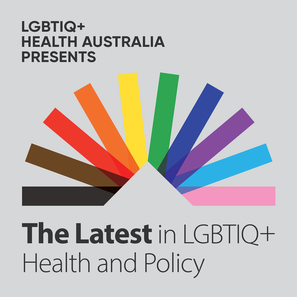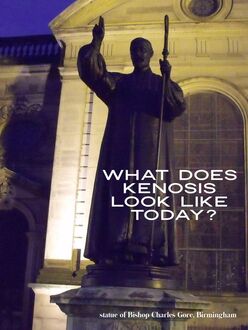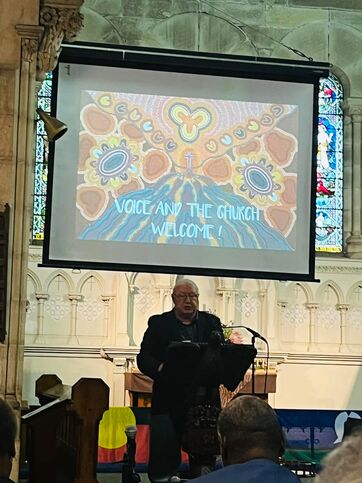|
Last year had some amazing highs, but I had some trying health and other struggles at times, and it is always hard to write in a vital congregational placement (especially with the demands of my pioneering ministry) so I'm very grateful for the encouragement and patience of Elenie Poulos and Kate Gleeson (co-editors) in enabling me to contribute an article to a small collection of essays on 'Religion and Politics after marriage equality: contemporary challenges in religious freedom'. My essay (which can be accessed here) built out of the tough experience of some of us, focuses on the marginalisation of transgender people and queer people of faith in queer activism and mainstream Australian churches during and after the Australian marriage-equality plebiscite. I entitled it: 'Climbing out from being thrown under the bus: queer faith futures in a transphobic political world'.
0 Comments
 It was good to share recently on The Latest in LGBTIQ+ Health and Policy - a podcast that brings the health and wellbeing hot topic discussions that matter to LGBTIQ+ people: Our conversation explored the intersection between faith and LGBTQ+ community, the changes happening within the church, overcoming barriers as a trans woman, and my 30 year relationship with wife Penny.' This podcast was produced by JOY Media – Australia’s Rainbow Community Media Organisation. For more information about JOYs services, visit joy.org.au/services Podcast: Play in new window | Download (Duration: 25:16 — 34.7MB) Subscribe or Follow Us: Apple Podcasts | Google Podcasts | Spotify | RSS  One of the features of Fr Peter Maher’s funeral this week was (as in death so in life!) the powerful struggle within it between two forms of Catholicism - one in which I passionately share spiritually (with others of other labels); and the other still addicted to power rather than justice, law rather than grace, patriarchy rather than the dynamic mutuality (with appropriate recognition of charisms) of the priesthood of all believers... It is (sadly) interesting to me that, whilst I am a lifelong Anglican, and one with decades of helping lead Anglican teaching and formation, my mother Church tradition rarely asks me to contribute to ways out of its neurotic obsessions with sexuality and gender, whereas others in other spaces do (‘a prophet is not without honour’ and all that?).
Here is a latest offering, with thanks to The Sisters of the Good Samaritan for the opportunity to offer a brief perspective on how flourishing LGBTIQA+ lives flow out core elements of Catholic wisdom down the centuries - not least in considering family, the Body, natural law, the imago dei, and God’s grace in Creation. For: ‘this is about reclaiming Catholic emphases on the centrality of God’s grace in the diverse expressions of creation and incarnation, rather than imposing false ideas of sin and shame on those who are actually gifts to help lead us into greater life together. LGBTIQA+ people of faith do not need welcome, or inclusion, for we are already at home with God, as family members and part of Christ’s Body, wholly natural, and imaging the divine in our diverse ways. What we do need is space to flourish, and thereby we can enable others to flourish also.’ See link to the article iFlourishing Together' in The Good Oil here - or text below...  Among the several fine contributions to last Saturday’s ‘Voice and the Church’ gathering was that by the Revd Dr Rangi Nicholson, Assistant Priest of Rangiatea Church, the oldest Māori Anglican Church in Aotearoa, and author of ‘Treaty, Church and Nation’, reminding us that though our own struggles are specific they are also common and enriched by solidarity with others across the globe. He spoke powerfully of what needs doing from Māori and Anglican experience in Aotearoa New Zealand - including how, without meaningful resources empowerment is limited, and how the Church needs to be held accountable for benefitting from oppression. There is so much, he rightly identified, that the Church needs to do in terms of recognition, repentance, restitution and reparation. His three future hopes are pertinent to struggles in Australia too, and beyond: 1. More commitment by the Church to truth telling and ‘the whole story’ - with repentance and reparations 2. the Church needs to put its own house in order re authentic partnership whilst offering constructive critique of Government’s commitment to the UN rights of Indigenous People, reimagining a more just Church and nation. 3. the need for the Church to contribute boldly and with love to a new constitution - to visioning and values clarification for the future of the country - as part of restorative justice As he says: Whilst Treaty, in the experience of Aotearoa, can be a ‘sacred covenant’ allowing new life and renewed attention, there needs to be much more - for: ‘Restorative justice needs to become a priority’ - led with young people... It is a bit of a tricky time for some of us right now with the tsunami of royalist outpourings - not least those like me, who, in Australia, also struggle with general Australian assumptions that, being English, we must therefore be monarchists. I’ve been trying to avoid the subject - and especially the media frenzy - but I guess, as I keep being asked about it, I’m trying to find a kind but honest answer. So I hope this doesn’t offend anyone, but other things should also be said...
 I continue to be flabbergasted (that’s the polite way of putting it) by the attempts of Churches to ‘apologise’ to LGBTIQ+ people whilst continuing to ignore our voices, maintaining shame, and hurting us afresh. The latest astonishing ‘apology’ is by the General Synod of the Anglican Church in Australia - actually ’deploring’ activity which it had itself just demonstrated. NO - this kind of ‘apology’ is not acceptable and represents a mockery of the deep understanding of costly repentance and reconciliation in the Christian tradition. Meanwhile, the Uniting Church - with more credibility but with significant holes in its LGBTIQ+ ‘inclusion’, including a current low level of trans awareness and engagement - has also been pursuing an apology process. This is a much better concept but one in which no transgender people have been included in the ‘apology’ group! (so there’s a first apology to make) A few obvious starters therefore for such ventures: * ‘Nothing about us without us’ * Cheap grace betrays the Gospel * Reparations matter More splendid creativity at Pitt Street from our worship team 😻 And - sad though I am not to share a first Pitt Street Christmas - I’m so delighted that my brilliant wife (Penny Jones) could preside yesterday. That is the first time for her with our community in Pitt Street - and maybe the first time a female cisgender Anglican priest has presided, with full church authority, in a mainstream Christian denomination in the centre of Sydney. ❤️ I think Maude Royden, the founder of the movement for the ordination of women, will have rejoiced in heaven - especially as Pitt Street gave her a pulpit on her famous visit to Australia years ago (see earlier post here). Hoping one day our good friends in some of the local Anglican and Catholic Churches will share the same blessing - for God’s sake, it was a woman who actually gave birth at Christmas!! It is just lovely to have a female vicar here in Market Rasen at this time and to think of female priests elsewhere in Australia presiding this year (some for the first time - including some of my former students I dearly love and admire). #shininglightinSydney #thankGodfortheUnitingChurch #livingAnglicanism #peacetoall As leading organisations representing and advocating with LGBTIQ+ People of Faith and People of Faith who support LGBTIQ+ members of our communities, we urge that the current Religious Discrimination Bill be withdrawn from Federal Parliament and a genuine participative process be established to enable widely-agreed protective, not persecuting, rights for all. As it stands, the Bill can only enflame and enable further religious-based repression, without addressing the most pressing issues of religious concern, which impact upon marginalised people like ourselves.
So many of members of our religious communities are victims of religious-institution-based abuse and these experiences of abuse are a significant driver of our desire to see real safeguards for people of faith and all Australians, so that we are all able to live out our religious beliefs and other convictions without experiencing harm in our community places, where there should be safe places for all Australians. We have seen (not least in the Royal Commission into Institutional Responses to Child Abuse) how easily that safety can be lost - and how easily the true religious values of church or religious institutions are lost - when leaders exercise power without scrutiny and accountability. As LGBTIQ+ People of Faith, and People of Faith who support our LGBTIQ+ members, our participation in religious bodies takes many forms, but one central aspect is to challenge the self-serving actions of institutional leadership, and to create and push for checks and balances to the abuses of power and political influence in the hierarchies of religious bodies. We are concerned that this Bill would further embolden those who currently wield so much institutional power, to use this power to the detriment of ordinary People of Faith in religious institutions and schools, who find themselves the target of harassment and bullying for their sex, ability/disability, marital status, sexual orientation or gender identity - ordinary People of Faith who are there in every congregation and school, and who ask only to be accepted and supported in their faith journeys.. This Bill, as currently framed, would make it extraordinarily difficult for ordinary people of faith to experience this safety and acceptance; it would make it difficult for us to hold our leaders to account. LGBTIQA+ people are to be found in every faith community, and have particular need for understanding and support in contexts where they have historically been abused, misunderstood and scapegoated. LGBTIQA+ People of Faith don’t just cease to exist because a particular religious faction refuses to acknowledge their presence. LGBTIQ+ People of Faith and People of Faith who support LGBTIQ+ members of our communities refuse to stop existing simply because an institution would prefer us not to exist. We are a part of our faith communities, and that we continue to offer service to our faith and our religious institutions. We ask that our basic human rights to be recognised and those of all other vulnerable people whose lives are at threat from this legislation. Signatories: Australian Catholics for Equality Equal Voices Fellowship of Metropolitan Community Churches Australia Progressive Christian Voice Rainbodhi LGBTQIA+ Buddhist Community Rainbow Catholic InterAgency for Ministry Spark Church Sydney Queer Muslims Uniting Network a reflection on the journey to genuine 'inclusion' for the Diversity & Inclusion Council of Uniting NSW/ACT
Thank you so much for the opportunity of sharing with you today. Let me first acknowledge the Gadigal peoples of the land from which I speak, and their elders past, present and emerging. I would also like to express my thanks for the work Uniting is already doing in terms of diversity and inclusion, including the vital encouragement this is to myself personally. For genuine visibility of our human diversity is so critical and enriching, as I know from my own experience and the huge number of people who contact me, from all kinds of places. joyfully receiving gifts One of the things I have learned from First Nations peoples is the importance of genuineness of spirit and intent. Back in 1986 in Alice Springs, Pope John Paul II put this well in sharing with Aboriginal and Torres Strait Islander peoples. ‘Until your gifts have been offered’, he said, ‘and joyfully received, the Church in Australia will not be that which Jesus Christ wants to see.’ That challenging truth remains central not only to the Church, but to all parts of Australian life. Until First Nations’ gifts have been fully offered, and joyfully received, with justice, then we will never be the country we can be. That must be the underlying theme of all we do in terms of diversity and inclusion. Yet those words apply more broadly, don’t they? Until the gifts of Asian, Pacific Islander, Middle Eastern, African, LGBTQ+ people, and all kinds of Australians have been offered, and – crucially - ‘joyfully received’, then we will not be what we can be. ‘Joyfully’ is a key adjective. What spirit and intent do we really have? If we approach inclusion mainly as an obligation (politically correct or otherwise), we will have missed the point. For one thing, anyone feels more likely to offer their gifts if there is likely to be a joyful reception. We will never maximise the capacity of any organisation, whether a church, a nation, or Uniting, if we do not joyfully embrace the gifts we are offered. What an opportunity we have as we emerge from, hopefully, the worst of what COVID-19 has done to expose the divisions and distinctions of wealth and power among us in Australia! To build back best, fully, and joyfully, enabling diversity and inclusion is vital. The character of our intent and its spirit is crucial. weak inclusion - as a noun In my experience, ‘inclusion’ can be a very weasel word, covering many continuing sins and PR appearances. Organisations have at least three approaches. The first is what I would call ‘weak’ inclusion. It is better than obvious exclusion but essentially about degrees of permission to belong. It is like a noun: it is somewhat fixed, concerned with quotas and boundaries, but really still involving social distancing rather than engagement. At times and in places, the Uniting Church exercises this kind of inclusion. You can belong as a minority, but are you really honoured, engaged, and joyfully received? That too is where many First Nations people were in Anglican circles in Southern Queensland, including in Anglicare, until we began our Reconciliation Action Plan a few years ago. medium inclusion - as an adjective Secondly, there are ‘medium’ approaches to inclusion. This is what I have experienced in moving into Uniting Church ministry. It involves a genuine welcome, with some affirmation, openness to involvement, and certainly much kindness. Whereas ‘weak’ inclusion is mainly being allowed to the table, this might even include being at the head of the table. Other than Anglo ethnicities, and LGTBQ+ and other networks are also taken with some seriousness. Inclusion becomes more like an adjective than a noun – it is about being inclusive, more dynamic than simply inclusion. It is where the Reconciliation Action Plan was in the Anglican Church Southern Queensland when I left, and maybe, where Uniting is right now. It is, however, only a happier, but not yet fully joyful stage. strong inclusion - as a verb A third stage of inclusion has a deeper spirit and intent. This ’strong’ stage is not about even genuine welcome, but about revealing the gifts of all. It includes affirmation but is really about celebration, led by everyone in our diversity when we are all truly empowered. It is about inclusion as a verb: about active practice day by day; including like Uniting, as a dynamic community of living and belonging. It is also wonderful for any organisation. For we no longer have to work hard at showing we are diverse and inclusive. We demonstrably are. It is our very DNA. Others see it, which also saves many promotional expenses! The Uniting Church aspires to this, and at times manages it. The most visible sign is the Covenant with Uniting Aboriginal & Islander Congress - although, even there, questions remain, including about resourcing and how voices are actually heard and make a difference. Yet the Uniting Church as a whole is not there yet. I sense however that Uniting can move into at least some kind of ‘stronger’ inclusion, where all levels of staff and operations see it as their own work. That is another major shift, but ultimately, as it becomes more natural, it in fact requires less work from advocates and leadership than ‘weak’ and ‘medium’ inclusion – for it belongs to everyone, when everyone truly belongs. True including thus also leads on to expansiveness. sea-change We live in the tag end of some frankly rubbish times, when the very dignity of some human beings has been under question. We have major policies of exclusion in Australia, including towards First Nations claims for justice, towards refugees, some migrants and the poor. Currently, we also have hurtful bills of religious discrimination in federal and state parliaments. Yet my belief is that these are rotten but passing times. I see the journey towards Australian diversity and inclusion as like a sea-change. The waves come in at different speeds. Sometimes they rise high: as with the 1967 Referendum, the Apology to the Stolen Generations, Marriage Equality, and so forth. At times they fade away and we think the tide has gone. Yet it will assuredly return. The key thing is to hold faith and make ready for the next big wave of Australian diversity and inclusion. It will come, and those who are prepared can surf it. Others who do not prepare will flounder. For there is, let’s face it, no vibrant and really sustainable future for Australia without renewing our multicultural identity. Uniting is well placed to seize that time when it comes, if it continues to move more deeply into diversity and inclusion. So, May God bless us all in this exciting journey! |
AuthorJo Inkpin is an Anglican priest serving as Minister of Pitt St Uniting Church in Sydney, a trans woman, theologian & justice activist. These are some of my reflections on life, spirit, and the search for peace, justice & sustainable creation. Archives
July 2024
Categories
All
|

 RSS Feed
RSS Feed